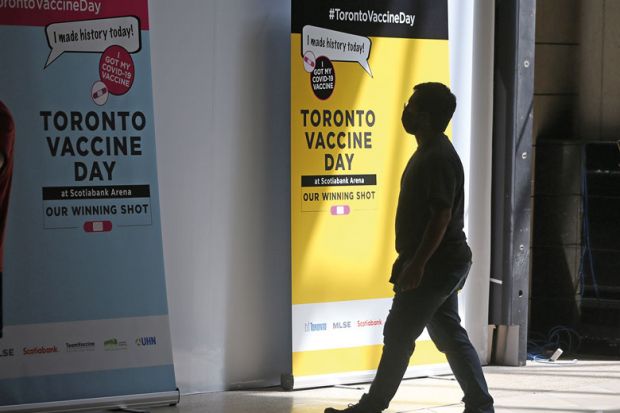After weeks of pressure from academic staff and growing concern about the resurgence of Covid, Canadian post-secondary institutions are scrambling just ahead of the autumn semester to impose student vaccination requirements.
In reversals from just a month earlier, several leading institutions – including the University of Toronto, McMaster University, the University of Alberta, the University of Ottawa and the University of Calgary – have made vaccinations mandatory.
“Universities across the country have done about-faces” after first rejecting requirements or calling them legally impermissible, said one leading mandate advocate, Jacob Shelley, an associate professor of law and of health sciences at Western University.
Yet concerns remain. Some other top Canadian institutions – led by the University of British Columbia and McGill University – have declined to require student vaccinations. And some of those with requirements limited their scope or allowed self-declarations without clear evidence.
And more fundamentally, some faculty fear, the dispute is demonstrating the shrinking power of academia in domestic politics when pressing an argument based on scientific health and community well-being.
The prolonged hesitancy among Canadian universities to require vaccinations, said Amir Attaran, a professor of law at Ottawa, shows their “deep commitment to scientific mediocrity and disobservance of the public interest”.
The situation in Canada had provided an unusual contrast with the US, which has a vocal and powerful minority of anti-vaccination activists, and yet saw hundreds of its universities readily impose vaccination requirements.
The logjam across Canada appeared to have been broken a couple of weeks ago by the University of Ottawa, Professor Shelley said. That happened in part, he continued, because of law faculty such as Professor Attaran who argued publicly that institutions had no basis to claim that they lacked the legal authority to require vaccinations on campus.
That quickly led others to follow suit, Professor Shelley said. Additional factors that might have driven the shift, he added, included a rising fear among institutions and their leaders that they could be sued if their policies contributed to an infection outbreak.
Universities and their staff, however, also are constrained by a growing wariness of alienating provincial leaders who had been declining to order campus-wide vaccination mandates, Professor Shelley said.
Whether it was intended by politicians, he said, the recent declaration of insolvency by Laurentian University – after Canadian leaders bailed out companies in numerous other sectors – is being taken by academic staff as an especially ominous warning to be careful about publicly criticising government actions.
“That had a chilling effect,” Professor Shelley said of Laurentian’s quick entry into insolvency proceedings and the resulting cuts in staff positions.
That anxiety appears to have reached the top levels of Canadian higher education. Salvatore Spadafora, the vice-dean of postgraduate medical education at the University of Toronto, who serves as special adviser to the institution’s president on Covid, expressed frustration with the premier of Ontario, Doug Ford, when Toronto announced its vaccine requirement and its provision allowing people merely to “attest to” their compliance.
Mr Ford is a supporter of Donald Trump, and he has mirrored the former US president’s stance that vaccinations should be a matter of individual choice rather than public safety.
“A provincial policy”, Dr Spadafora said in an initial Toronto announcement, “would help to remove confusion and ambiguity about the requirements for everyone in the post-secondary sector.” The university subsequently required proof of vaccination on campus after the Ontario government made clear that it was required. That, however, was never necessary for universities to act, said Amir Attaran, a professor of law and public health at the University of Ottawa. “Cowardly and craven administrators may want to deflect blame on to the province”, but courts have made clear that provincial approval was not needed, Professor Attaran said.


